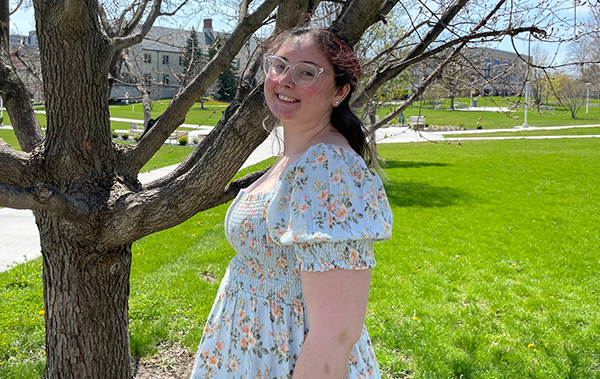It took Maggie Bennekamper a semester or two to decide on the type of psychology work she wanted to focus on. But once she made her decision, she went all in with her coursework, research and extracurricular activities.
Bennekamper, a student in the Jesup Scott Honors College, will graduate from The University of Toledo with a bachelor’s degree in psychology May 7, and will join a top doctoral program at the University of Delaware in the fall.

CELEBRATING SUCCESS: UToledo recognizes the Class of 2022 with a series of stories featuring students receiving their degrees at spring commencement.
“It feels kind of unbelievable,” Bennekamper said. “I started off not going this route. I’m really proud to have been able to flip my path and use everything I’ve learned and build on it. Not only my academic path through undergrad but all the extracurricular activities I took on like presenting at conferences, participating in different workshops, being a part of a few different mentorship programs and being really involved in research on campus.”
Bennekamper initially enrolled in UToledo’s pre-med program and considered clinical psychology at one point. Her focus shifted to psychology research after taking a social psychology class and spending time in the Social Health Lab run by Dr. Andrew Geers, professor in the Department of Psychology in the College of Arts and Letters.
“That’s where I developed and recognized my love for research and realized I wanted to take that path rather than the medical path,” Bennekamper said. “I was really interested in healthcare and still continue to be interested in making healthcare more accessible and equitable to people. I thought I needed to go into the medical field to do that. Being in a health research lab, there’s a lot I can do in a research way of things that are more hands-on.”
Bennekamper joined the Social Health Lab, a division of UToledo’s InSPHIRe Lab, as a research assistant in 2019 and has been the undergraduate lab manager for the last year.

Maggie, a student in the Jesup Scott Honors College, graduates from UToledo with a bachelor’s degree in psychology on May 7, and joins a top doctoral program at the University of Delaware in the fall.
She has given 14 conference presentations, including seven on her honors thesis, which focuses on finding alternatives to pharmacological treatments to prevent over-prescription of medication. Bennekamper also wants her research to help close the gap in healthcare accessibility for children and underrepresented communities.
The doctoral program in the Department of Psychological and Brain Sciences at the University of Delaware will allow Bennekamper to combine her interests in healthcare and social advocacy.
“A lot of health issues over time can be heavily impacted by our mental health and how other people make us feel,” Bennekamper said. “We want to target how people are interacting in a way that can hopefully mend or elevate their overall health, and, on the other side, focus on healthcare providers and how they can be cognizant of things people have going on in their life. A complex system of things can impact a patient’s health, and we want to influence how they interact with their patients to serve them best.”
Geers has worked alongside Bennekamper for several years and commends her drive to succeed and make an impact.
“It has been a joy to have Maggie in my research lab the past several years,” he said. “She worked hard and has taken advantage of every opportunity available to her. Maggie is a great example of a UToledo student. She is bright, motivated and interested in improving the future for everyone. I couldn’t be more excited for Maggie. She is on her way to one of the top social psychology graduate programs in the country to study topics she really loves.”